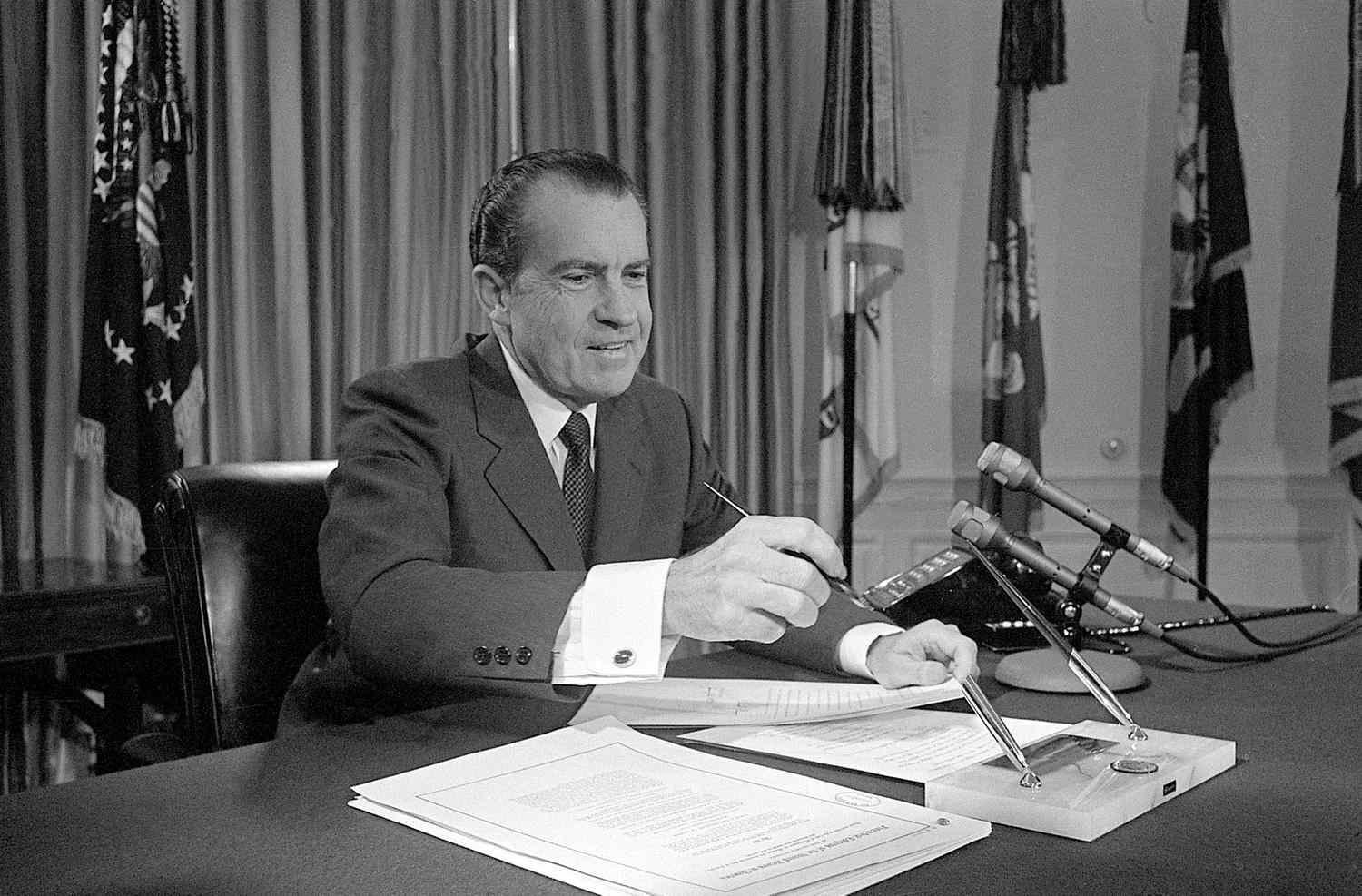
Richard Nixon, the 37th President of the United States, remains a figure of both admiration and controversy in American history. From his rise to prominence as a young congressman to his tumultuous presidency and ultimate resignation, Nixon’s life was marked by enigmatic moments that captivated the nation’s attention. Behind his polished exterior, Nixon was known for his secrecy, political maneuvering, and the infamous Watergate scandal that led to his downfall. In this article, we will delve into 11 fascinating and mysterious facts about Richard Nixon that will shed light on the complexities of his character and the impact he had on the American political landscape.
Key Takeaways:
- Richard Nixon faced both triumph and downfall, from the Checkers Speech boosting his popularity to the Watergate Scandal leading to his resignation, leaving a complex legacy in American history.
- Nixon’s presidency saw significant diplomatic achievements, such as opening relations with China and the historic Apollo 11 moon landing, but his involvement in the Watergate Scandal remains a controversial part of his legacy.
The Checkers Speech
One of the most infamous moments in Richard Nixon’s career was the Checkers Speech. In 1952, during his campaign as Dwight D. Eisenhower’s running mate, Nixon addressed allegations of financial impropriety. It was televised nationally, and Nixon used the opportunity to defend himself, mentioning his family dog, Checkers. This speech helped boost Nixon’s popularity and is often cited as a key moment in his political career.
Watergate Scandal
The Watergate Scandal, which rocked the Nixon presidency, remains one of the most significant political scandals in American history. It involved illegal activities by members of the Nixon administration to sabotage the Democratic Party during the 1972 presidential election. Ultimately, it led to Nixon’s resignation in 1974, making him the only U.S. president to step down from office.
Opening Diplomatic Relations with China
In a surprising move, President Nixon decided to establish diplomatic relations with the People’s Republic of China in This decision marked a significant shift in U.S. foreign policy, as the United States had not maintained official relations with China since the communist revolution in Nixon’s visit to China helped ease tensions between the two nations and paved the way for future cooperation.
The End of the Vietnam War
Nixon’s presidency saw the end of the Vietnam War. He implemented a policy known as “Vietnamization,” which aimed to gradually withdraw American troops while training and equipping South Vietnamese forces to take over the fight. In 1973, a peace agreement was signed, and the last American troops left Vietnam. However, the war was still a controversial issue during Nixon’s time in office.
Wage and Price Controls
In response to inflationary pressure during the 1970s, President Nixon imposed temporary wage and price controls in This was a controversial decision, as it went against free-market principles. The controls aimed to stabilize prices and curb inflation, but they were ultimately lifted in 1973 due to concerns about their effectiveness.
Nixon’s Visit to the Soviet Union
In 1972, President Nixon traveled to the Soviet Union for a historic summit with Soviet leader Leonid Brezhnev. This visit aimed to improve relations between the two superpowers and led to the signing of several agreements, including the Strategic Arms Limitation Treaty (SALT I). Nixon’s visit was seen as a significant step towards détente during the Cold War.
The Environmental Protection Agency
In 1970, President Nixon signed the legislation that established the Environmental Protection Agency (EPA). This agency was created in response to growing concerns about pollution and environmental degradation. The EPA’s purpose was to develop and enforce regulations to safeguard the environment. Its establishment marked a turning point in national efforts to protect the environment.
The Apollo 11 Moon Landing
On July 20, 1969, during Nixon’s first term as president, the Apollo 11 mission successfully landed on the moon. This historic event marked a major achievement for the United States in the Space Race with the Soviet Union. President Nixon spoke to the astronauts from the Oval Office via a phone call transmitted from the moon, solidifying America’s place in space exploration history.
Resignation and Pardon
In the face of imminent impeachment for his involvement in the Watergate Scandal, Richard Nixon announced his resignation as President of the United States on August 8, Shortly after leaving office, Nixon was granted a full pardon by his successor, President Gerald Ford. The pardon was controversial and drew criticism from those who believed Nixon should have faced legal consequences for his actions.
Nixon’s Memoirs
After his resignation, Richard Nixon wrote a memoir titled “RN: The Memoirs of Richard Nixon.” In this book, he provided his account of the political events throughout his life, including his 1968 presidential campaign, foreign policy achievements, and reflections on the Watergate Scandal. The memoirs were met with both praise and criticism but remain an important historical document.
The Frost/Nixon Interviews
In 1977, three years after his resignation, Richard Nixon agreed to a series of televised interviews with British journalist David Frost. These interviews aimed to elicit Nixon’s admission of wrongdoing in relation to the Watergate Scandal. The discussions were intense and gripping, providing viewers with a rare glimpse into Nixon’s mindset and offering insights into the depths of the scandal.
Conclusion
In conclusion, Richard Nixon remains one of the most enigmatic figures in American history. His presidency was marked by both remarkable achievements and scandalous controversies. From his foreign policies, such as the opening of relations with China, to the Watergate scandal that ultimately led to his resignation, Nixon’s legacy is complex and often debated.Despite the controversies surrounding him, Nixon made significant contributions during his time in office. His efforts to improve relations with China and the Soviet Union helped lay the groundwork for future diplomacy. The creation of the Environmental Protection Agency and the signing of landmark legislation such as the Clean Air Act and the Clean Water Act demonstrated his commitment to environmental preservation.Yet, Nixon’s legacy will forever be tarnished by the Watergate scandal. The attempted cover-up of illegal activities during his reelection campaign cast a dark shadow over his presidency and ultimately led to his downfall.Whether remembered for his achievements or his mistakes, Richard Nixon remains a fascinating and enigmatic figure in American politics. His presidency serves as a reminder of the complexities of leadership and the enduring impact of one’s actions.
FAQs
1. What was Richard Nixon’s role in the Watergate scandal?
Richard Nixon’s role in the Watergate scandal was that of a conspirator. While there is no direct evidence linking him to the initial break-in at the Democratic National Committee headquarters, it was later revealed that he was aware of the illegal activities and attempted to cover them up. This ultimately led to his resignation.
2. What were Richard Nixon’s significant achievements as president?
Richard Nixon’s significant achievements as president include opening diplomatic relations with China, signing key environmental legislation, and establishing the Environmental Protection Agency. He also implemented policies to desegregate schools and created the Supplemental Security Income program.
3. How did Richard Nixon’s presidency impact foreign relations?
Richard Nixon’s presidency had a significant impact on foreign relations. His policy of “detente” aimed to ease tensions between the United States and the Soviet Union, leading to arms control agreements such as the Strategic Arms Limitation Treaty (SALT I). His groundbreaking visit to China in 1972 helped lay the foundation for future diplomatic relations.
4. Did Richard Nixon face any consequences for his involvement in the Watergate scandal?
Yes, Richard Nixon faced consequences for his involvement in the Watergate scandal. As evidence mounted against him, he faced impeachment in the House of Representatives. To avoid a Senate trial, he chose to resign from office in 1974. This made him the first and, to date, the only U.S. president to resign from office.
5. How is Richard Nixon remembered today?
Richard Nixon is remembered today as a complex and controversial figure. While his accomplishments in foreign policy and environmental protection are acknowledged, he is also associated with one of the greatest political scandals in American history. This duality in his legacy continues to spark debates and discussions about his place in history.
If Nixon's enigmatic life has piqued your curiosity, consider exploring more intriguing facts about the controversial president. Delve into the gripping details surrounding "The Assassination of Richard Nixon" movie, which sheds light on a dark chapter in American history. For a change of pace, discover surprising facts about Ben Stein, a man of many talents who served as Nixon's speechwriter. Lastly, don't miss the opportunity to learn more about the iconic "Frost/Nixon" interviews, which offered an unprecedented glimpse into the mind of the disgraced former president.
Was this page helpful?
Our commitment to delivering trustworthy and engaging content is at the heart of what we do. Each fact on our site is contributed by real users like you, bringing a wealth of diverse insights and information. To ensure the highest standards of accuracy and reliability, our dedicated editors meticulously review each submission. This process guarantees that the facts we share are not only fascinating but also credible. Trust in our commitment to quality and authenticity as you explore and learn with us.


